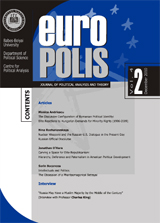THE DISCURSIVE CONFIGURATION OF ROMANIAN POLITICAL IDENTITY: Elite Reactions to Hungarian Demands for Minority Rights (1996-2009)
THE DISCURSIVE CONFIGURATION OF ROMANIAN POLITICAL IDENTITY: Elite Reactions to Hungarian Demands for Minority Rights (1996-2009)
Author(s): Monica AndriescuSubject(s): Politics / Political Sciences
Published by: Centrul de Analiza Politica
Keywords: minorities; discourse; elites; Romania
Summary/Abstract: The identity profiles discursively shaped by the Romanian and Hungarian political elites have been antagonistic throughout the post-communist period: while the former is outlined in the logic of standardization, the latter is marked out in terms of accommodation. The first identity frame is characterized by the following elements: the preservation of rigid norms and structures in the socio-political sphere, the desire to extract full compliance to them even when they are not expressive of a different background (ethnic, cultural etc.), the assimilation of non-conformity to social rules with “disloyalty” to the state, reluctance to engage in negotiations that might curtail their decision-making monopoly. On the other hand, the latter has as markers the subsequent elements: a visible dynamic stance as a means for engaging in negotiations that generate consensual rather than one-sided decisions, the aspiration to challenge the present social or political organization, attachment of great importance to targeted norms, which allow for the free expression of minority identity at all levels. Seeing that the existing literature has generally analyzed the Hungarian elites’ minority rights discourse expressive of the abovementioned features, the present article will explore the discursive stances of the Romanian political elites on the topic.
Journal: Europolis, Journal Of Political Science And Theory
- Issue Year: 4/2010
- Issue No: 02 (8)
- Page Range: 155-175
- Page Count: 21
- Language: English

